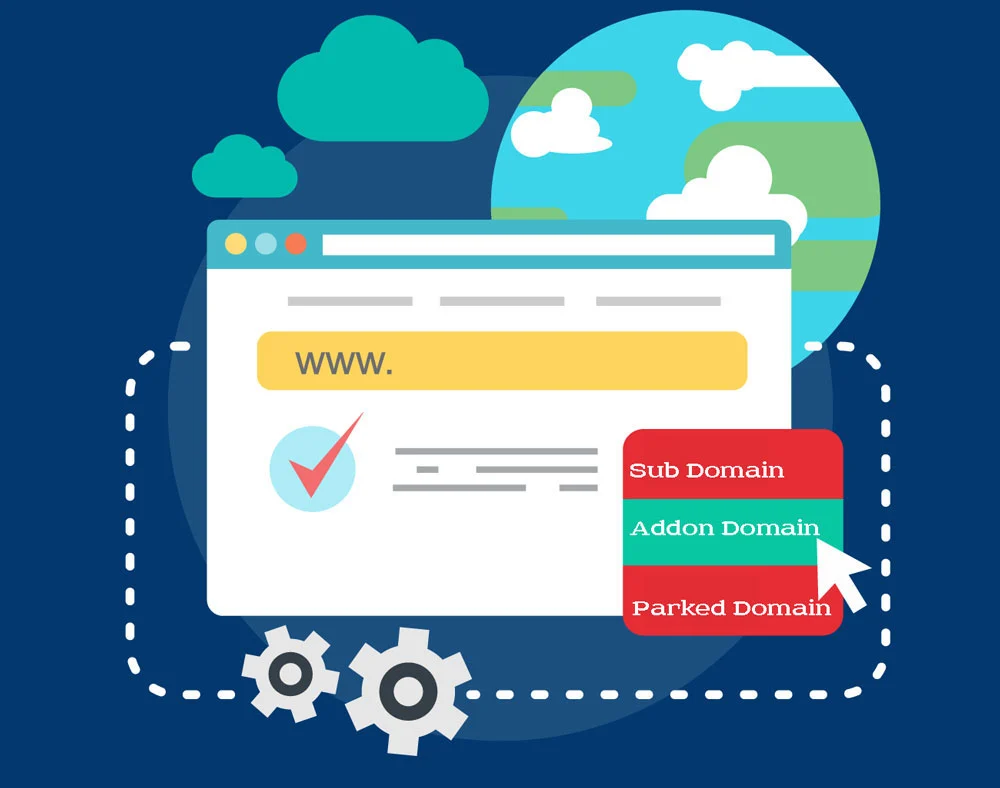Discover the power of expanding your website’s capabilities with the comprehensive guide to addon domains. When navigating the complexities of online presence, understanding what an addon domain is becomes crucial. An addon domain is an additional domain that can be added to your hosting account, providing versatility for managing multiple websites efficiently.
Not only does this guide from 1Byte demystify the technical jargon surrounding addon domains, but it also sheds light on the practical aspects of their setup. Users can easily grasp the steps involved in adding an addon domain, making it an accessible solution for those seeking to optimize their web presence.
But why should one bother with addon domains? Well, the benefits are manifold. From cost-effective strategies to enhanced website organization, addon domains offer a distinct advantage. Dive into this guide to unlock the potential of addon domains and elevate your online experience. Whether you’re a novice or an experienced website owner, the insights provided here ensure a clear understanding of how addon domains can shape your digital landscape.
What is an Addon Domain?
Unlocking the potential of your website starts with understanding the fundamental question: What is an addon domain? An addon domain, simply put, is an additional domain that you can attach to your existing hosting account. This dynamic feature allows website owners to manage multiple domains seamlessly.
FURTHER READING: |
| 1. Domain vs Subdomain: Understanding the Key Differences and When to Use Each |
| 2. The .biz Domain Meaning: A Deep Dive |
| 3. What Is .mil Domain? Exploring Its History and Mission |
Detailed definition of an addon domain
An addon domain, in the realm of website management, refers to an extra domain that a user can add to their hosting account. This dynamic tool facilitates the hosting of multiple websites, each with its unique domain name. Now, let’s delve into a more detailed definition to demystify the concept further.
Essentially, an addon domain is a fully functional and independent website with its own content, email accounts, and resources. Think of it as having multiple websites under one hosting umbrella. This feature is particularly valuable for website owners looking to expand their online presence without the need for separate hosting plans.

Unlike a subdomain, which is a subset of the primary domain, an addon domain stands alone. It has its own root folder within the hosting account, allowing for a clear separation of files and data. This distinction is crucial for maintaining the autonomy of each website and ensuring efficient management.
FURTHER READING: |
| 1. How to Get an .edu Domain for Your University |
| 2. What Is .int Domain? Exploring Its History and Mission |
| 3. What Does .org Mean? Exploring Its History and Mission |
How an addon domain differs from a primary domain
Understanding the differences between an addon domain and a primary domain is crucial for effective website management. An addon domain, while similar to a primary domain in many aspects, has distinct characteristics that set it apart.
Firstly, an addon domain is an additional domain added to an existing hosting account. In contrast, a primary domain is the main domain associated with the hosting account, representing the primary website. The primary domain is typically the one users initially associate with their hosting plan.
An addon domain is a separate entity with its root folder within the hosting account. This autonomy allows it to have its unique set of files, content, and email accounts. In contrast, the primary domain encompasses the main account and controls the primary website’s files and resources.
When it comes to setup, the primary domain is usually established when users first subscribe to a hosting plan. On the other hand, addon domains are added later through the hosting control panel as users decide to expand their online presence. This flexibility enables website owners to manage multiple websites without the hassle of separate hosting plans.
5 Benefits of Using Addon Domains
The versatility offered by addon domains goes beyond just hosting multiple websites – it’s about enhancing your online experience in various ways. Let’s explore the compelling advantages that come with using addon domains and how they can elevate your digital presence to new heights.
Cost-Effective
One of the standout benefits of incorporating addon domains into your web strategy is the significant cost-effectiveness they bring. Hosting multiple websites under a single hosting account means you don’t have to invest in separate hosting plans for each domain. This translates to substantial savings, allowing website owners to allocate resources more efficiently.
By choosing addon domains, users can harness the power of multiple websites without the added financial burden. It’s a practical solution for individuals or businesses looking to expand their online presence without breaking the bank. The cost-effectiveness of addon domains empowers users to scale their digital ventures without compromising their budget, making it an attractive option for those seeking economical yet powerful website management.
Efficient Management
Addon domains not only offer cost-effectiveness but also pave the way for efficient management of multiple websites. With addon domains, website owners can streamline their operations by centralizing the control within a single hosting account. This consolidation simplifies tasks such as updates, backups, and monitoring, saving valuable time and effort.
Efficient management becomes particularly evident when considering tasks like domain renewals and updates. Instead of navigating through multiple hosting accounts, users can handle all aspects of their websites in one centralized location. This centralized approach not only enhances efficiency but also minimizes the risk of oversights and errors that can occur when managing websites across different platforms.
The simplicity of addon domains makes them an ideal choice for those who value ease of use and effective time management. By consolidating website management, users can focus on the growth and development of their digital ventures, without the hassle of navigating through multiple hosting accounts. Ultimately, the efficient management offered by addon domains contributes significantly to a smoother and more streamlined web management experience.
Improved SEO Opportunities

Addon domains open up a realm of improved SEO opportunities for website owners seeking enhanced online visibility. By hosting multiple websites under a single hosting account, users can create a network of interconnected domains that complement each other. This interconnectedness can contribute positively to search engine rankings, as search algorithms often favor websites with a robust and diverse online presence.
Having addon domains allows users to target specific keywords and niches with individual websites, increasing the chances of ranking for a variety of relevant search terms. Each addon domain, with its unique content and focus, adds depth to the overall online presence, making the entire network more appealing to search engines.
Furthermore, the ability to manage multiple websites efficiently means quicker updates and responsiveness to changes in SEO strategies. Website owners can adapt and optimize each addon domain independently, staying ahead in the dynamic landscape of search engine optimization.
Flexibility
The flexibility offered by addon domains is a key factor that makes them a valuable asset in web management. With addon domains, users have the freedom to adapt and expand their online presence according to changing needs and goals. This flexibility is evident in various aspects of website management.
Users can easily add or remove addon domains based on their evolving strategies, ensuring that their online portfolio aligns with the dynamic nature of the digital landscape. This adaptability is crucial for businesses and individuals looking to scale their web presence without the constraints of rigid hosting plans.
Moreover, the flexibility extends to content management. Each addon domain can have its unique theme, design, and content, allowing users to cater to diverse audiences or target different niches. This customization ensures that each website within the network serves its purpose effectively, contributing to the overall success of the digital venture.
The beauty of addon domains lies in their ability to provide a scalable and adaptable solution for website owners. Whether it’s adding new projects, exploring different niches, or adjusting to market trends, the flexibility of addon domains empowers users to stay agile and responsive in the ever-changing digital landscape.
Brand Expansion
Addon domains provide a powerful avenue for brand expansion, allowing website owners to diversify their online presence and reach a broader audience. This strategic approach to brand building involves creating multiple websites, each dedicated to a specific aspect or niche related to the overarching brand.
By utilizing addon domains, brands can establish a network of interconnected websites, each contributing to the overall brand identity. This interconnectedness creates a cohesive online ecosystem that reinforces the brand message and engages diverse audience segments.
Brand expansion through addon domains also offers the advantage of targeting different keywords and demographics. Each addon domain can focus on specific products, services, or content, allowing the brand to tailor its messaging to distinct target audiences. This targeted approach enhances the brand’s visibility and resonance across various online platforms.
3 Steps of Setting Up an Addon Domain
Setting up an addon domain is a straightforward process that can be broken down into three simple steps. By following these steps, website owners can seamlessly integrate additional domains into their hosting accounts, unlocking the full potential of addon domains in enhancing their online presence.
Access the Web Hosting Control Panel
To initiate the addon domain setup, begin by accessing the web hosting control panel. Open your web browser and enter the URL your hosting provider supplied, typically in the format “yourdomain.com/cpanel” or “yourdomain.com:2083”. Input your login credentials – a username and password provided by the hosting provider – to gain entry.
Once logged into the control panel, users can navigate to the designated section for addon domains. This serves as the central hub for configuring and customizing addon domains seamlessly. The control panel is the gateway to unlocking the potential of addon domains, enabling website owners to efficiently manage multiple websites under a single hosting account. Now, proceed to the next steps to complete the addon domain setup process and enhance your online presence.
Adding the Addon Domain
Once logged into the control panel, the next step in setting up an addon domain is to navigate to the section labeled “Addon Domains” or “Domains.” Click on the “Addon Domains” option to initiate the process.
Within the “Addon Domains” section, enter the desired domain name in the designated field. Ensure to exclude the “http://” or “https://” part of the domain. The control panel will automatically populate the “Subdomain” and “Document Root” fields for convenience.

Customization is an option; users can personalize the subdomain if desired. However, it’s crucial to ensure the document root is accurately set, directing to the directory where files for the addon domain will be stored.
To finalize the process, click the “Add Domain” or “Add Addon Domain” button. This action prompts the control panel to create the necessary DNS records and establish the link between the addon domain and your hosting account.
Create a New Directory
To facilitate seamless file management for the addon domain, creating a new directory is a vital step. Follow these straightforward steps within the file manager of your hosting control panel:
- Open the file manager and locate the “public_html” or “www” directory, representing the root directory of your primary domain.
- Navigate to this root directory to ensure proper organization of your files.
- Inside the root directory, create a new directory where the files for the addon domain will be stored.
- This new directory can be named according to your preference, ensuring it is relevant and easy to identify.
By creating a dedicated directory within the root directory, website owners enhance the organization and accessibility of files associated with the addon domain. This step is crucial for maintaining a structured file system and facilitates efficient web management, ensuring a smooth integration of the addon domain into your hosting account.
Leverage 1Byte’s strong cloud computing expertise to boost your business in a big way
1Byte provides complete domain registration services that include dedicated support staff, educated customer care, reasonable costs, as well as a domain price search tool.
Elevate your online security with 1Byte's SSL Service. Unparalleled protection, seamless integration, and peace of mind for your digital journey.
No matter the cloud server package you pick, you can rely on 1Byte for dependability, privacy, security, and a stress-free experience that is essential for successful businesses.
Choosing us as your shared hosting provider allows you to get excellent value for your money while enjoying the same level of quality and functionality as more expensive options.
Through highly flexible programs, 1Byte's cutting-edge cloud hosting gives great solutions to small and medium-sized businesses faster, more securely, and at reduced costs.
Stay ahead of the competition with 1Byte's innovative WordPress hosting services. Our feature-rich plans and unmatched reliability ensure your website stands out and delivers an unforgettable user experience.
As an official AWS Partner, one of our primary responsibilities is to assist businesses in modernizing their operations and make the most of their journeys to the cloud with AWS.
Conclusion
Mastering the art of addon domains unveils a world of possibilities for website owners seeking a robust and flexible web presence. By following the comprehensive guide outlined above, individuals and businesses can seamlessly integrate addon domains into their hosting accounts, expanding their online footprint effortlessly.
The advantages are clear – from cost-effective solutions and efficient management to improved SEO opportunities and brand expansion. The simplicity of the process, outlined in three easy steps, empowers users to navigate the complexities of web management with confidence.
With each addon domain representing a new avenue for content, services, or products, website owners can tailor their digital strategy to meet diverse needs and engage varied audiences. The ability to create a network of interconnected websites not only streamlines management but also enhances the overall impact in the digital landscape.
As the comprehensive guide on addon domains concludes, website owners are encouraged to explore the vast potential these dynamic tools offer. Whether a novice or an experienced webmaster, understanding and harnessing the power of addon domains can elevate one’s online presence to new heights, opening doors to unlimited possibilities in the ever-evolving realm of the internet.

